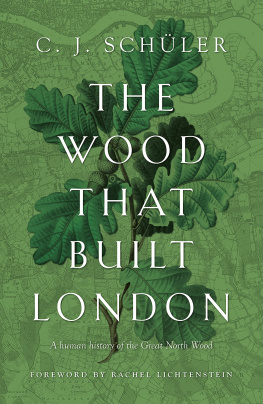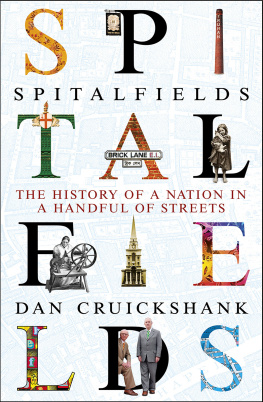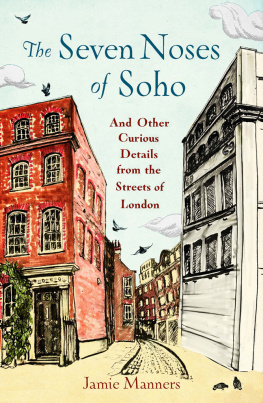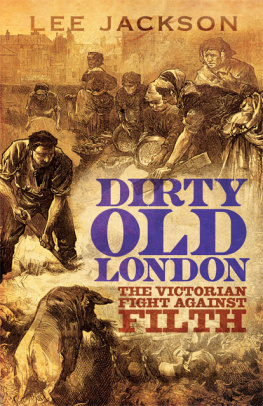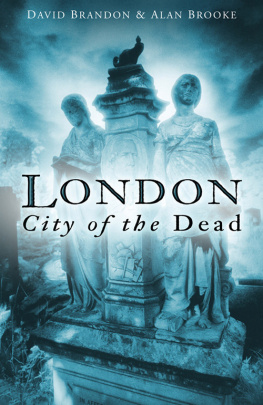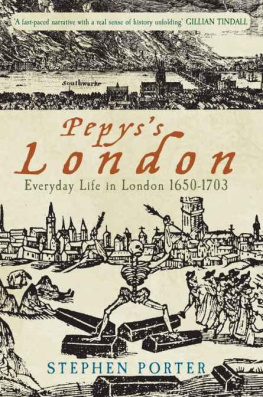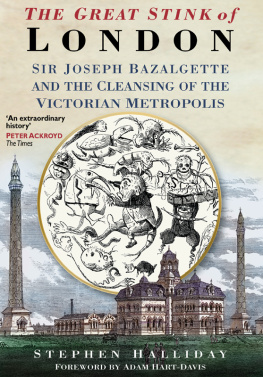LONDON
IN MODERN TIMES.
INTRODUCTION.
This history of an old city opens many views into the realms of the past, crowded with the picturesque, the romantic, and the religiouswith what is beautiful in intellect, sublime in feeling, noble in characterand with much, too, the reverse of all this. Buildings dingy and dilapidated, or tastelessly modernized, in which great geniuses were born, or lived, or died, become, in connection with the event, transformed into poetic bowers; and narrow dirty streets, where they are known often to have walked, change into green alleys, resounding with richer notes than ever trilled from bird on brake. Tales of valor and suffering, of heroism and patience, of virtue and piety, of the patriot's life and the martyr's death, crowd thickly on the memory. Nor do opposite reminiscences, revealing the footprints of vice and crime, of evil passions and false principles, fail to arise, fraught with salutary warnings and cautions. The broad thoroughfare is a channel, within whose banks there has been rolling for centuries a river of human life, now tranquil as the sky, now troubled as the clouds, gliding on in peace, or lashed into storms.
These dwelling-places of man are proofs and expressions of his ingenuity, skill, and toil, of his social instincts and habits. Their varied architecture and style, the different circumstances under which they were built, the various motives and diversified purposes which led to their erection, are symbols and illustrations of the innumerable forms, the many colored hues, the strange gradations of men's condition, character, habits, tastes, and feelings. Each house has its own historya history which in some cases has been running on since an era when civilization wore a different aspect from what it does now. What changeful scenes has many a dwelling witnessed!families have come and gone, people have been born and have died, obedient to the great law"the fashion of this world passeth away." Those rooms have witnessed the birth and departure of many, the death of the guilty sinner or pardoned believer, the gay wedding and the gloomy funeral, the welcome meeting of Christmas groups around the bright fireside, and the sad parting of loved ones called to separate into widely divergent paths. Striking contrasts abound between the outward material aspect and the inward moral scenery of those habitations. In this house, perhaps, which catches the passenger's eye by its splendor, through whose windows there flashes the gorgeous light of patrician luxury, at whose door lines of proud equipages drive up, on whose steps are marshaled obsequious footmen in gilded liveries, there are hearts pining away with ambition, envy, jealousy, fear, remorse, and agony. In that humble cottage-like abode, on the other hand, contentment, which with godliness is great gain, and piety, better than gold or rubies, have taken up their home, and transformed it into a terrestrial heaven.
All this applies to London, and gives interest to our survey of it as we pass through its numerous streets; it clothes it with a poetic character in the eyes of all gifted with creative fancy. The poetry of the city has its own charms as well as the poetry of the country. The history of London supplies abundant materials of the character now described; indeed, they are so numerous and diversified that it is difficult to deal with them. The memorials of the mother city are so intimately connected with the records of the empire, that to do justice to the former would be to sketch the outline, and to exhibit most of the stirring scenes and incidents of the latter. London, too, is associated closely with many of the distinguished individuals that England has produced, with the progress of arts, of commerce and literature, politics and law, religion and civilization; so that, as we walk about it, we tread on classic ground, rich in a thousand associations. Its history is the history of our architecture, both ecclesiastical and civil. The old names and descriptions of its streets, houses, churches, and other public edifices, aided by the few vestiges of ancient buildings which have escaped the ravages of fire, time, and ever-advancing alterations, bring before us a series of views, exhibiting each order of design, from the Norman to the Tudor era. In the streets of London, too, may be traced the progress of domestic building, from the plain single-storied house of the time of Fitzstephen, to the lofty and many-floored mansion of the fifteenth century, with its picturesque gables, ornamented front, and twisted chimneys. Then these melt away before other forms of taste and art. In the days of Elizabeth, churches and dwellings become Italianized. The architects under the Stuart dynasty make fresh innovation, till, during the last century, skill and genius in this department reached their culminating point. Since that period a recurrence to the study of old models has gradually been raising London to distinction, with regard to the elegance and beauty of its architectural appearance.
The history of London is the history of our commerce. Here is seen gushing up, in very early times, that stream of industry, activity, and enterprise, which from a rill has swelled into a river, and has borne upon its bosom our wealth and our greatness, our civilization, and very much of our liberty.
The London guilds and companies; the London merchant princes; the London marts and markets; the London granaries for corn; the public exchanges, built for the accommodation of money-brokers and traders long before Gresham's time; the London port, wharfs, and docks, crowded with ships of all countries, laden with treasures from all climes; the London streets, many of which still bear the names of the trades to which they were allotted, and the mercantile purposes for which they were employed:all these, which form so large a part of the materials, and supply so great a portion of the scenes of London history, are essentially commercial, and bring before us the progress of that industrial spirit, which, with all its failings and faults, has contributed so largely to the welfare and happiness of modern society.
The history of London is a history of English literature. Time would fail to tell of all the memorials of genius with which London abounds; memorials of poets, philosophers, historians, and divines, who have there been born, and lived, and studied, and toiled, and suffered, and died. No spot in the world, perhaps, is so rich in associations connected with the history of great minds. There is scarcely one of the old streets through which you ramble, or one of the old churches which you enter, but forthwith there come crowding over the mind of the well-informed, recollections of departed genius, greatness, or excellence.
The history of London is the history of the British constitution and laws. There thicken round it most of the great political conflicts between kings and barons, and lords and commons; between feudalism and modern liberty; between the love of ancient institutions and the spirit of progress, from which, under God, have sprung our civil government and social order.


